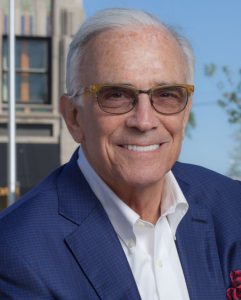Commentary
How Whole Foods Embraced & Enriched Detroit
Aug 08, 2017
By Peter Cummings
When Whole Foods announced their decision to build a store in Midtown Detroit almost six years ago, the announcement was greeted with considerable skepticism. Many commented that the store would never get built. Others said that if it were built it would close within the first year.
June 5 of this year, the store will celebrate the 4th anniversary of its opening and its success has been resounding. Whole Foods officials acknowledge that it is in the top 10 percent of all stores in the country from the standpoint of sales per square foot.
How did this happen? Why in the face of such skepticism has the store done so well and why did Whole Foods decide to build it in the first place? Whole Foods moved forward with the project largely due to the passion of Walter Robb, the former Co-CEO of the company. He believed in the importance of adding a high-quality grocery store to the city. He believed that there was more purchasing power than traditional demographic metrics indicated.
The project also required the participation of Sue Mosey, the executive director of Midtown Detroit, Inc. (MDI). Under the direction of Sue, MDI has proven to be one of the country’s most effective Community Development Corporations. I have been collaborating with Sue for almost 25 years and she has a keen understanding of both the social and economic dimensions of her job. With her assistance and guidance, I was able to secure the incentives and funding support required to make the Whole Foods project viable.
Finally — and this component proved vital — Whole Foods was masterful at integrating itself into the community. From the time the lease was signed, they inserted into the neighborhood two employees—Red Elk Banks and Amanda Musilli—to present to groups large and small the concept of the store and the products and services it would offer. Months before the store opening, the company started classes in the community on how to apply for a job at Whole Foods. Simultaneously, the Whole Foods team conducted seminars with local food entrepreneurs on how to manage their businesses and package their goods so that they would appear on the shelves of Whole Foods when the store opened.
After the store opened, in an additional leased space adjacent to the store, they opened a community kitchen to demonstrate to area residents how to shop at Whole Foods on a budget and how to cook nutritiously.
The success of the store reflects how underserved the residents of Detroit really are. But there is more to the story than that. It also reflects the value of engaging the community in a very personal way. By the time the store opened the company was perceived as part of the neighborhood and a visit to the Whole Foods Market today reveals that it is a community gathering space as well as a food store. It is an experience to shop there, an experience that appeals to young and old, black and white, rich and poor. The store has become one of those places where you can experience the diversity of Detroit and savor what is great about cities; and you can see that the instincts six years ago of Walter Robb have been fully vindicated.
—–
Peter D. Cummings is the founder of RAM, a leader in real estate investment, management and development, based in Palm Beach County and active throughout the Southeast. In 2015 he stepped down as chairman of RAM to create The Platform. The Platform is a new Detroit-based venture dedicated to helping rebuild the city through creating new housing and retail developments. Mr. Cummings has been active in real estate development and management in Florida, Michigan, Texas and North Carolina since 1975. He now divides his time between Florida and Michigan, where he serves on the Investment Committee of the Max M. Fisher Family Office and also serves on the board of the Detroit Symphony Orchestra.
Mr. Cummings was educated at Yale University (B.A. 1968) and the University of Toronto, where he received a Master’s Degree in English Literature in 1969. His first career was as a journalist for The Montreal Star in the early 1970s. In 1988, he completed the Owner & President Management Program at the Harvard Business School.
He currently is chairman emeritus and a board member of the Detroit Symphony Orchestra and a board member of the Norton Museum of Art. He is a past board member of the New York Philharmonic, Detroit Renaissance, Comerica Bank, League of American Orchestras, The Carolina Performing Arts Society National Advisory Board, The Madison Council of the Library of Congress, and United States Artists.
Mr. Cummings’ passion for music inspired a collaboration with Sirius XM Satellite Radio to create a show linking classical music to newer popular music forms, demystifying the classics and validating the work of the finest contemporary rock and pop artists. The show, aptly titled “Linked: Connecting the Classics” was heard monthly on Sirius XM from 2011 to 2014.

